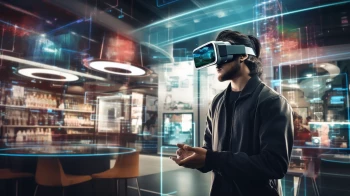In an era of rapid technological advancement, virtual reality (VR) has emerged as a groundbreaking innovation with the power to reshape the service industry. With its ability to transport individuals to immersive digital environments, VR is poised to transform customer experiences, redefine business operations, and elevate service sectors across the board. This article delves into the remarkable potential of virtual reality within the service industry, shedding light on its transformative capabilities, benefits, challenges, and what lies ahead.
Unleashing Virtual Reality's Potential in the Service Industry: Virtual reality, a technology that simulates a user's physical presence within a digital environment, has come a long way since its inception. With advancements in hardware and software, VR is no longer limited to gaming; it has permeated various industries, with the service sector standing to gain immensely.
Benefits of Virtual Reality in the Service Industry:
-
Enhanced Customer Experience: VR provides customers with immersive, interactive experiences, enabling them to engage with products and services in ways previously unimaginable. This heightened engagement fosters emotional connections, leading to increased loyalty and brand affinity.
-
Innovative Product Showcases: Businesses can use VR to showcase their offerings in unique and engaging ways. From real estate virtual tours to virtual car showrooms, VR elevates product demonstrations and boosts consumer interest.
-
Remote Collaboration: Virtual reality enables real-time collaboration across geographical boundaries. In fields like architecture and design, professionals can collaborate on projects as if they were in the same room, fostering efficient teamwork.
-
Training and Skill Development: VR-based training simulations immerse employees in realistic scenarios, enhancing skill development in a safe and controlled environment. This is particularly beneficial in industries such as healthcare and aviation.
-
Interactive Marketing Campaigns: Brands can create memorable marketing campaigns by immersing consumers in branded VR experiences, leaving a lasting impression and increasing brand recall.
-
Data Visualization: Complex data sets can be visualized in VR environments, facilitating better understanding and decision-making in fields like finance and analytics.
Challenges and Considerations:
-
Cost and Accessibility: High-quality VR equipment can be expensive, limiting its accessibility to certain demographics. Businesses must weigh the investment against potential returns.
-
Content Quality: Immersive experiences rely on high-quality content creation. Maintaining a balance between technical excellence and user engagement is crucial.
-
Motion Sickness: Some users may experience discomfort or motion sickness when using VR, which could hinder widespread adoption.
-
Learning Curve: Users, especially those unfamiliar with VR, may require time to acclimate to the technology, potentially affecting the initial user experience.
Real-world Applications:
-
Hospitality and Tourism: Virtual reality can transport potential guests to virtual hotel tours or travel destinations, allowing them to experience the ambiance before booking.
-
Retail: Virtual reality shopping experiences can replicate in-store interactions, allowing customers to try on products virtually before purchasing.
-
Education: VR can create engaging educational content, allowing students to explore historical events, scientific concepts, and cultural landmarks in immersive environments.
-
Healthcare: Surgeons can rehearse complex procedures using VR simulations, enhancing surgical precision and patient safety.
Conclusion: The service industry is on the brink of a VR revolution, where immersive experiences redefine customer engagement and business operations. The uncharted potential of virtual reality promises to enhance customer experiences, foster innovation, and drive digital transformation across various sectors. While challenges exist, the gradual integration of VR into the service industry landscape holds the promise of delivering unprecedented value, pushing boundaries, and shaping the future of how services are delivered and experienced.






